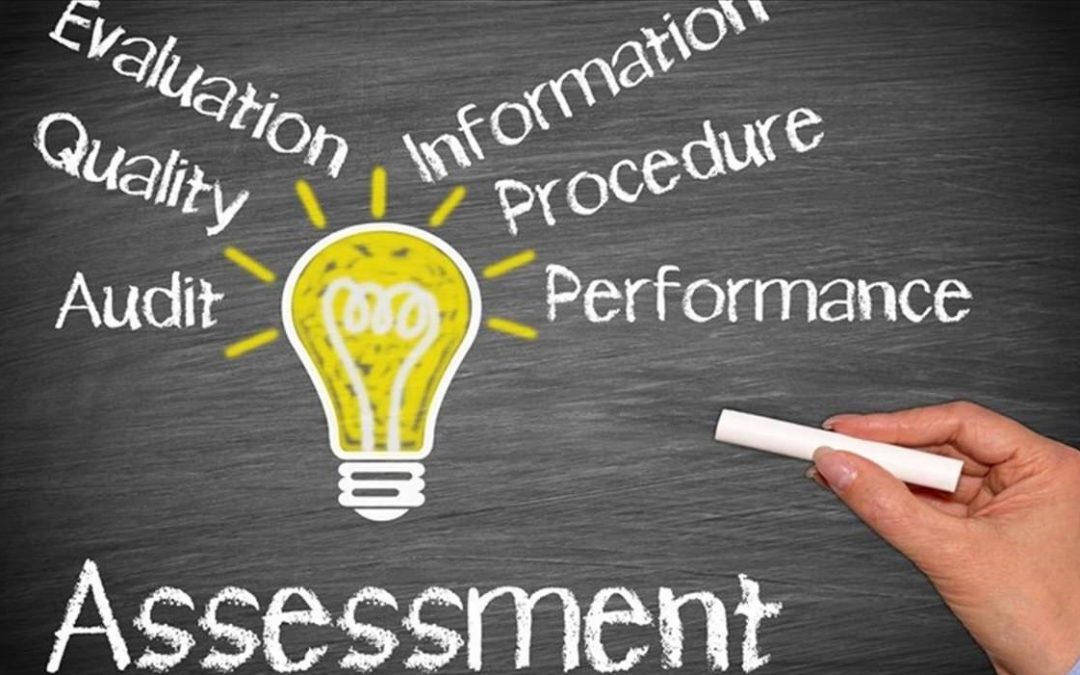Reducing Risk When Hiring Sales Leaders
With the sales leader failure rate at an all-time high, it’s time for a more comprehensive sales leader assessment. One that evaluates a job candidate’s ability to build and manage sales team operating processes. There are many tools that assess critical thinking, potential, motivation, behaviors, leadership, and communication skills. Unfortunately, they do not assess a candidates ability to build and manage sales team operating processes.
Candidates for sales leader positions tend to have solid sales expertise. They know how to acquire new customers, cross-sell, and manage customer accounts. Unfortunately, most have limited expertise building and managing sales team operating processes.
Previous sales leadership experience is one thing. Having the expertise to build and manage sales team operating processes is another.
So, how do we know if job candidates have the expertise to build and manage sales team operating processes?

From a Business Leaders Perspective, Hope Is No Longer A Method When Hiring A Sales Leader
How Do You Assess A Job Candidates Ability to Build & Manage Sales Team Operating Processes?
To answer this question, we conducted online research. We also interviewed business leaders, sales leaders, and talent management professionals. We found no consensus on how to evaluate a candidates ability to build and manage sales team operating processes. In simple terms, there is no universally accepted:
- Framework or textbook on how to build and manage sales team operating processes. We found three common themes. First, sales leader job responsibilities vary from company to company. Second, everyone has their own model for managing sales team operating processes. And third, there is no consistency from sales leader to sales leader, company to company, and industry to industry.
- Criteria for assessing a sales leaders ability to build and manage sales team operating processes. We found companies using three types of assessments. First, to assess selling skills. Second, to assess critical thinking, potential, motivation, behaviors, leadership, and communication skills. And third, to assess a few managerial skills i.e. coaching and evaluating.

We also found that many business leaders have limited expertise in this area. Three key themes emerged. First, business leaders rely on their sales leader to build and manage sales team operating processes. Second, they simply don’t know what they don’t know about
This makes for a high-risk environment when hiring a new sales leader. No wonder the failure rate is so high!
So, with no viable solution available, we built a sales leader assessment. One that provides in-depth insight
Evaluating Job Candidates Ability To Manage Sales Team Operating Processes
A four-step approach was used to build the sales leader assessment. We created:
- A framework for understanding sales team operating processes.
- Criteria for evaluating candidates against the framework.
- An implementation approach, to ensure accurate and uniform assessment.
- A reporting format for presenting findings to business leaders.
Step 1 – A Framework for Understanding Sales Team Operating Processes
We started by creating a complete set of sales team operating processes, sub-processes, activities, and tasks. This was accomplished by reviewing
Finally, we searched for a model or framework to organize the process hierarchy. We found a solution in an unlikely place; a textbook called The Principles of Strategic Management. It provides business leaders with a framework for achieving sustainable success. In recommends that business leaders proactively manage three strategic and twelve operating processes. They include:
- Strategy– forecasting, planning, organization structure, and culture
- Execution– process, people, technology, and information
- Evaluation– tracking, analyzing, reporting, and process improvement
If this is true for business leaders, then shouldn’t sales leaders manage to these processes too? For that matter, shouldn’t all department leaders manage to them?
This framework perfectly organized the information we found. It outlined the requirements for a sales team to execute with precision. Precision is defined as effective, efficient, and predictable. This framework serves as the foundation for the sales leader assessment.
Business leaders that use this framework affectionately refer to it as The Chief Sales Leader Framework.
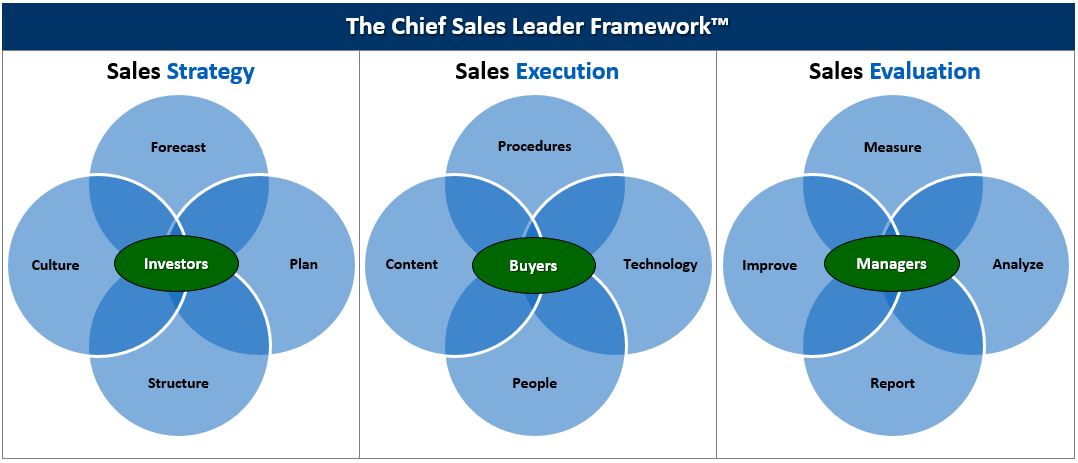
Click Here to learn more about The Chief Sales Leader Framework.
A Hidden Risk for Business Leaders When Hiring Sales Leaders
We compared sales leader job descriptions to The Chief Sales Leader Framework. Most are incomplete. In simple terms, many processes, sub-processes, activities, and tasks were not assigned to sales leaders. If these responsibilities are not assigned to the sales leader, then who is accountable for managing them?
Our initial thought was that the missing responsibilities were assigned to subordinate managers or leaders of other departments. So, we reviewed those job descriptions. We found that assumption to be partially true. Unfortunately, we found that many sub-processes, activities, and tasks were not assigned to anyone. This is clearly another hiring risk factor for business leaders to address.
To reduce hiring risk, we recommend that you complete the same exercise. Review and compare each sales leader, manager, and related job descriptions to The Chief Sales Leader Framework. This will help you uncover any sales team processes, sub-processes, activities, and tasks that are not assigned.
Step 2 – Criteria For The Sales Leader Assessment
Next we selected evaluation criteria for the sales leader assessment. To avoid randomly selecting criteria, we asked business leaders what information they were looking for. They wanted to understand each job candidates level of:
- Awareness of the processes, sub-processes, activities, and tasks
- Education on how to execute them
- Experience with managing them
- Best practice understanding for improving them
So, we combined this criteria with The Chief Sales Leader Framework. This created the sales leader assessment. It evaluates job candidates ability to build and manage sales team operating processes.
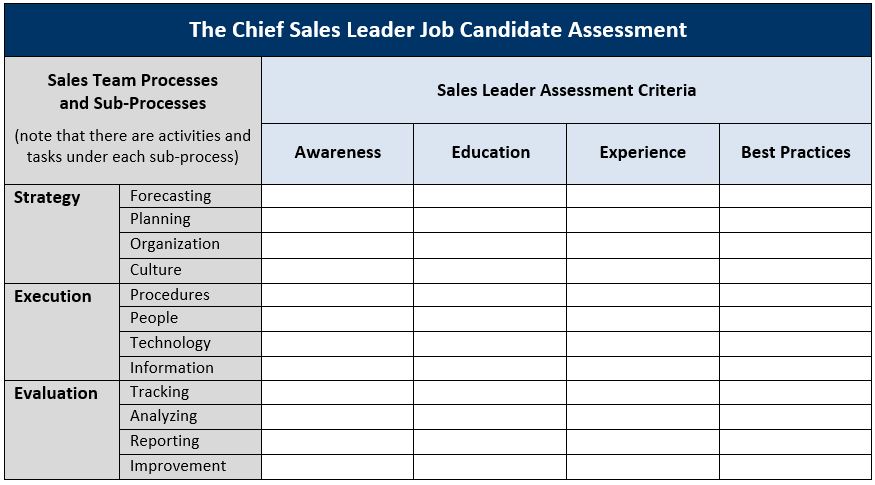
Step 3 – Implementing The Sales Leader Assessment
With a sales leader assessment in place, we built an implementation approach. Business leaders requested a flexible approach with varying depth of insight. So, we created a three-step implementation approach. Each step could be implemented on its own or in conjunction with the other steps. The steps include a:
- Self-assessment that is completed online by the job candidate. This provides insight on how a job candidate perceives their ability to manage the twelve sub-processes.
- Content-assessment that is completed after the self-assessment by talent management or an outside third-party. This consists of an in-depth review and comparison of the candidate’s background. We typically include resume, job application form, LinkedIn profile, and completed self-assessment. This provides insight into potential gaps between their self-assessment and the content-assessment.
- Expert Interview-assessment that is completed by talent management or an outside third-party. This consists of a phone and/or in-person interview. It provides an opportunity to question candidates about their self-assessment and/or the content-assessment.
Implementing all three-steps maximizes insight on job candidate’s ability to manage sales team operating processes.
When During the Hiring Process Do Business Leaders Use This Sales Leader Assessment?
Business leaders request the assessment at two key times during the hiring process. The first, is prior to the phone screening interview. The self-assessment and content-assessment are completed first. This enables more targeted questions to be asked during the phone screening interview. Then the expert interview-assessment is completed prior to in-person interviews. It enables more targeted questions to be asked during in-person interviews.
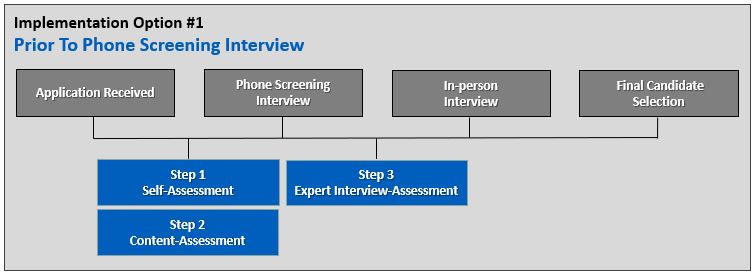
The second, is prior to final candidate selection. The self-assessment, content-assessment, and expert interview-assessment are completed. This provides an additional comparison point for screening the finalists.
Both approaches help screen out candidates that have limited expertise building and managing sales team processes.
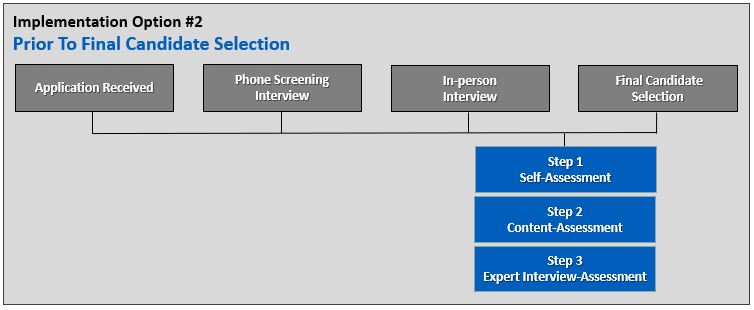
Step 4 – Reporting Format for The Sales Leader Assessment
Rather than guess at how business leaders wanted to view insights gleaned from assessments, we asked them. We found that they wanted two types of reports:
- Candidate Slate Report that includes:
- Table visually summarizing the candidates rank order from lowest risk to highest risk for managing sales team operating processes.
- Executive summary of the slate of candidates.
- Questions for the hiring manager to ask candidates during in-person interviews.
- Recommendations on the top two to three candidates and their potential risk for managing sales team operating processes.
- Individual Candidate Report that includes:
- Table visually summarizing the candidate’s scores from lowest risk to highest risk for managing sales team operating processes.
- Executive summary about the candidate.
- Questions for the hiring manager to further explore during an in-person interview.
Recommended
Business leaders preferred a PDF or Word document with bullets and tables for quick review and comparison.
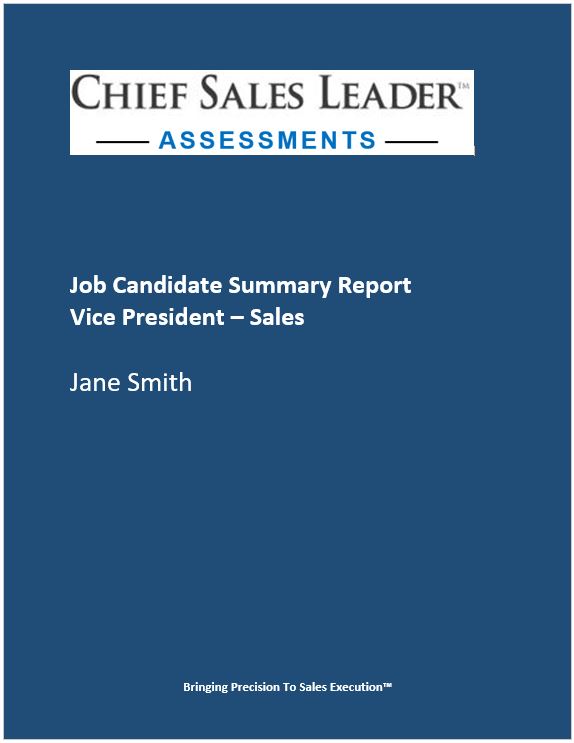
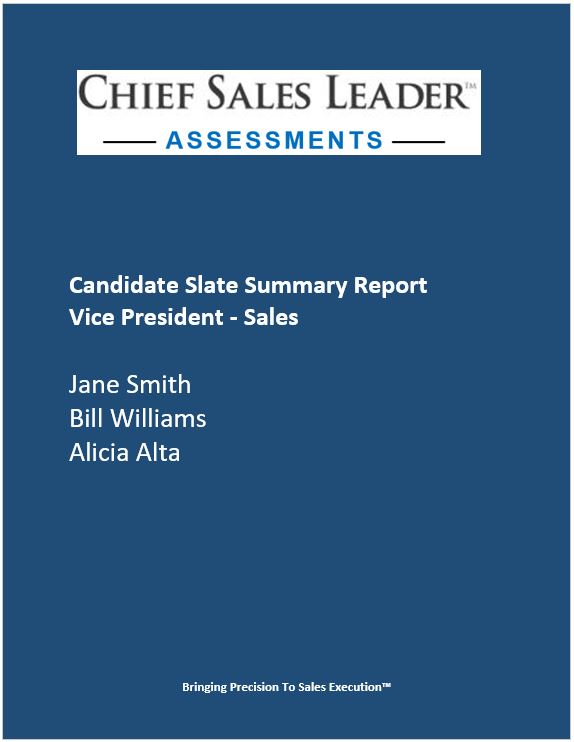
What Impact Does Using This Sales Leader Assessment Have?
Assessing job candidate’s ability to manage sales team operating processes had multiple impacts including:
- Reduced hiring risk by screening out candidates with limited sales team operating process expertise.
- Early identification of gaps in sales leader job responsibility assignment.
- Identification of information for newly hired sales leader career development planning.
- Improved business leader and talent management understanding of sales team operating processes.
In simple terms, assessing a job candidate’s ability to manage sales team operating processes saves time, money, morale, and careers.
Conclusion
With the sales leader failure rate at an all-time high, it’s time for a more comprehensive sales leader assessment. One that evaluates a job candidate’s ability to build and manage sales team operating processes.
From a business leaders perspective, hope is no longer a method when hiring sales leaders. Reducing sales leader hiring risk is a strategic imperative. Evaluating job candidates ability to build and manage sales team operating processes is no longer optional. It’s a hiring mandate that saves time, money, morale, and careers.
Please Take A Minute To:
- Write a comment on this post
- Click Here to learn more about The Chief Sales Leader Job Candidate Assessment
- Share this blog with other sales leaders, salespeople, CEO’s and investors
It’s time to bring precision – – effectiveness, efficiency, and predictability – – to sales execution.

